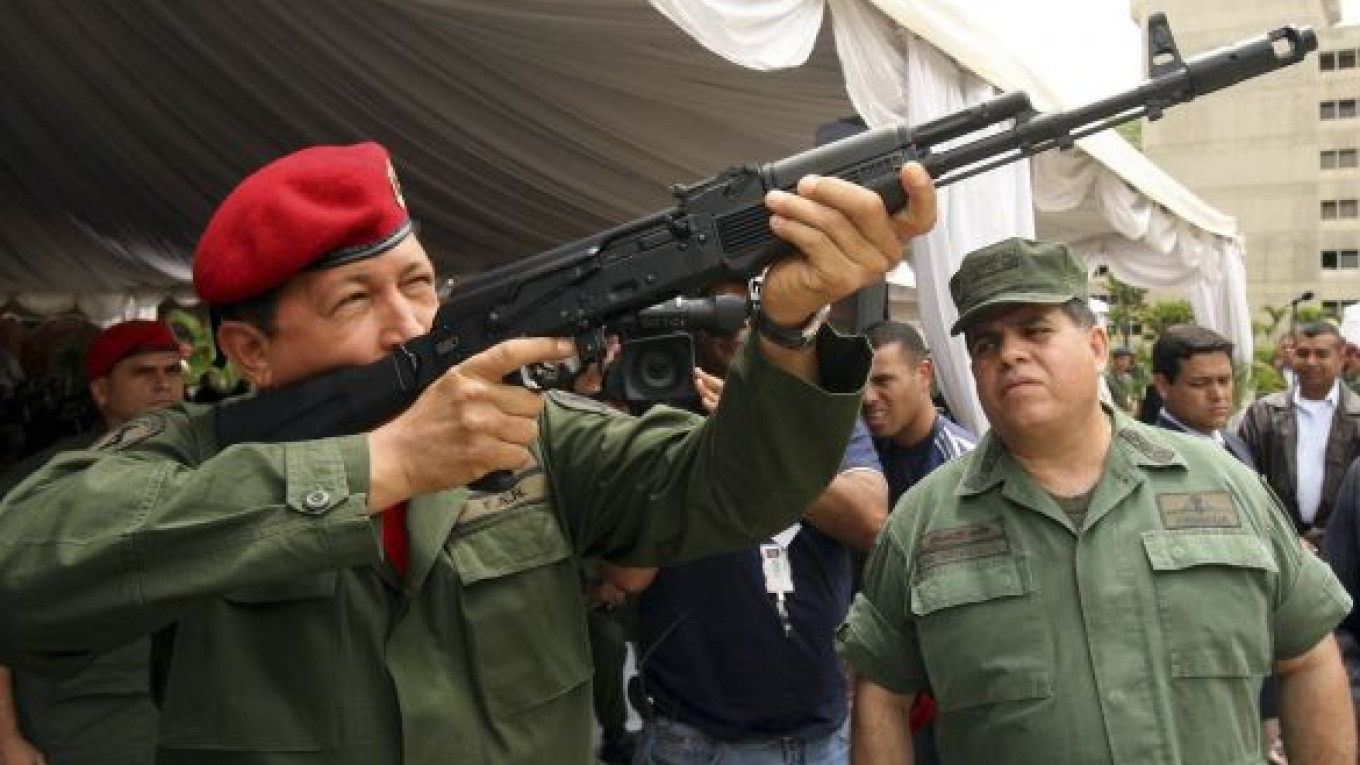Signaling that Russia hopes to maintain warm ties with Venezuela after Hugo Chavez's death, President Vladimir Putin on Wednesday called for the two countries to follow a path toward even stronger ties and praised the late president as “a close friend of Russia.”
Putin has sent a telegram to Caracas expressing his “deepest condolences” to Vice President Nicolas Madura and the Venezuelan people, the Kremlin said.
“Vladimir Putin praised the Venezuelan leader's personal efforts to lay a solid foundation for a Russian-Venezuelan partnership that has developed strong political ties and led to large-scale humanitarian and development projects,” the Kremlin said in a statement. “He also expressed his confidence that Russia and Venezuela would continue on this path of strengthening and developing relations.”
Putin, who met with Chavez multiple times over the past 12 years, also praised his legacy, calling him "an outstanding leader and manager and a close friend of Russia."
"He was an extraordinary and powerful man who looked to the future and always set the highest bar for himself," Putin wrote in the telegram.
Chavez, who brokered deals from oil to arms with the country, died of complications from cancer at a Caracas hospital at 4:25 p.m. local time, or 12:55 a.m. Moscow time. Madura, who announced the death, has been running the country since Chavez underwent a fourth operation for cancer in December, and he must now call an election within 30 days.
No matter who wins, the loss of the flamboyant leader might put Russia's oil contracts in Venezuela in jeopardy, analysts said.
Several Russian companies, including Rosneft and Gazprom Neft, are developing the Junin-6 heavy oil field as part of the National Oil Consortium. The deal was brokered by the powerful chairman of Rosneft, Igor Sechin, a former deputy prime minister and a close Putin ally who established good personal relationship with Chavez.
Venezuela also owes Russia more than $7 billion for Russian weapons purchased under a defense policy pursued by Chavez since Putin was first elected president in 2000.
A date for the presidential election has not been announced, but Maduro, a former bus driver and trade union activist who Chavez selected as his heir, could win on a wave of support following the death. But he also could face an uphill battle because he lacks Chavez's appeal and charisma, said Viktor Semyonov, an analyst with the Institute of Latin American Countries at the Russian Academy of Sciences.
He will likely be challenged for the presidency by opposition leader Henrique Capriles Radonski, a former governor of the Miranda state who ran as the main candidate against Chavez in the last presidential election in October.
Radonski has said that Venezuela would not buy any more Russian weapons if he becomes president.
Venezuela has declared seven days of mourning, and its embassy in Moscow opened a book of condolences for people to sign Wednesday. Visitors were welcome to stop by between 9 a.m. and 5 p.m. at the embassy at 13/15 Bolshoi Karetny Pereulok, near the Tsvetnoi Bulvar metro station in central Moscow.
Foreign Minister Sergei Lavrov, whose meetings with Chavez included a visit to Caracas in August 2011, planned to sign the book later Wednesday, Interfax reported.
Earlier, Russia's UN ambassador, Vitaly Churkin, called Chavez' death “a tragedy.”
"He was a great politician for his country, Latin America and the world,” Churkin, told reporters in New York.
“He played a very important role in the development of relations between Venezuela and Russia, so we feel very badly about it," Churkin said, referring to his death.
In Perm, meanwhile, an outspoken local Communist activist and lawyer appealed to the governor's office to rename a street after Chavez.
“Chavez symbolizes the reforms that Russia needs, like the nationalization of key economic sectors.” Alexei Bessonov said in comments carried by Interfax. “So I believe that changing the name of a street in Perm in honor of Hugo Chavez could be the first step for such a change in our country.”
Chavez renationalized the oil industry and other sectors of the economy, infuriating foreign investors but winning kudos at home from the impoverished, whom he promised that the measures would help.
The Perm governor's office said it had not received any request to rename a street.
“Moreover,” a spokesman told Interfax, “I'd like to point out that the job of renaming streets is carried out by the city of Perm's toponymy committee.”
Related articles:
A Message from The Moscow Times:
Dear readers,
We are facing unprecedented challenges. Russia's Prosecutor General's Office has designated The Moscow Times as an "undesirable" organization, criminalizing our work and putting our staff at risk of prosecution. This follows our earlier unjust labeling as a "foreign agent."
These actions are direct attempts to silence independent journalism in Russia. The authorities claim our work "discredits the decisions of the Russian leadership." We see things differently: we strive to provide accurate, unbiased reporting on Russia.
We, the journalists of The Moscow Times, refuse to be silenced. But to continue our work, we need your help.
Your support, no matter how small, makes a world of difference. If you can, please support us monthly starting from just $2. It's quick to set up, and every contribution makes a significant impact.
By supporting The Moscow Times, you're defending open, independent journalism in the face of repression. Thank you for standing with us.
Remind me later.


